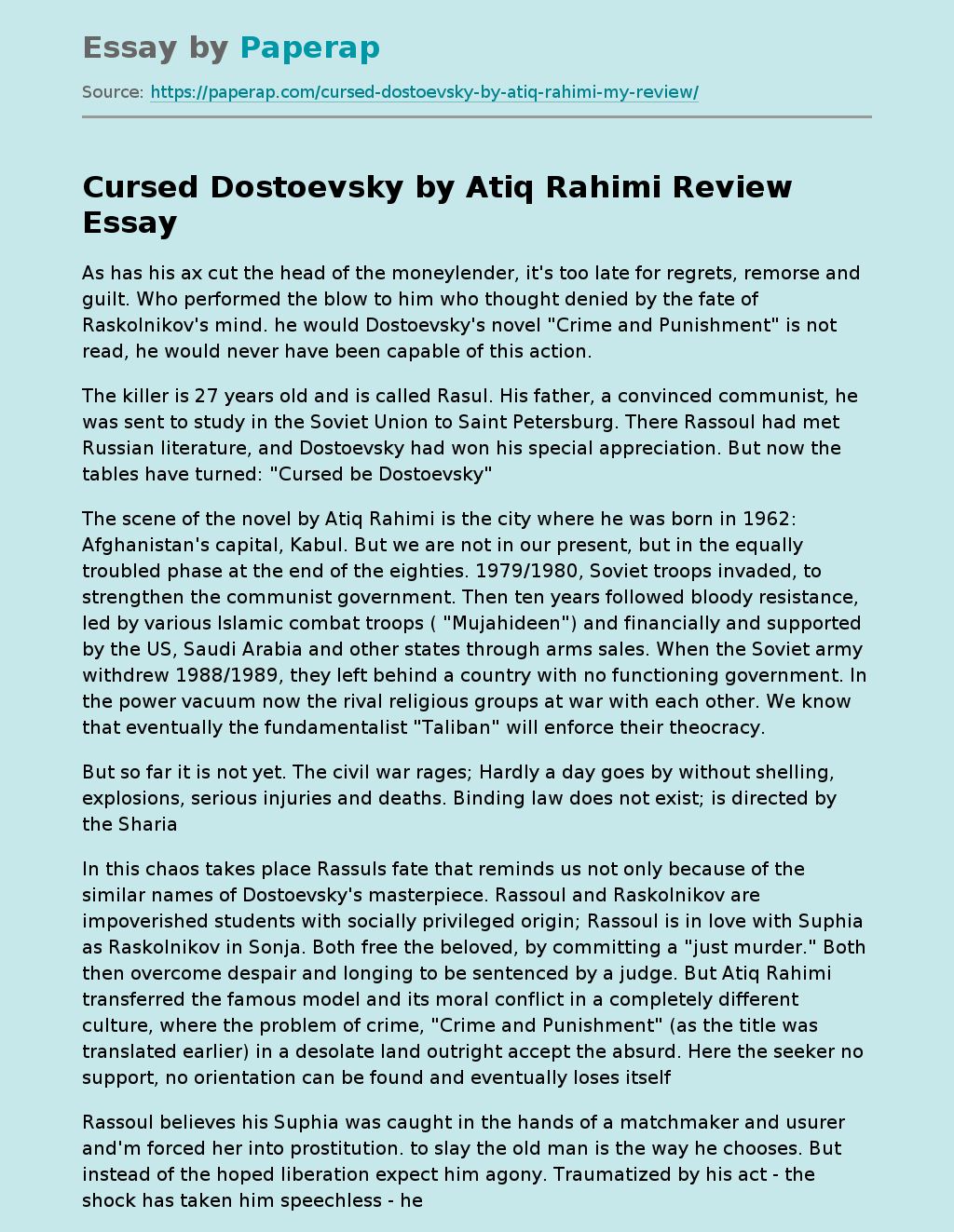Cursed Dostoevsky by Atiq Rahimi Review
The following sample essay on “Cursed Dostoevsky by Atiq Rahimi Review”: discussing on Cursed Dostoevsky and Taliban.
As has his ax cut the head of the moneylender, it’s too late for regrets, remorse and guilt. Who performed the blow to him who thought denied by the fate of Raskolnikov’s mind. he would Dostoevsky’s novel “Crime and Punishment” is not read, he would never have been capable of this action.
The killer is 27 years old and is called Rasul.
His father, a convinced communist, he was sent to study in the Soviet Union to Saint Petersburg. There Rassoul had met Russian literature, and Dostoevsky had won his special appreciation. But now the tables have turned: “Cursed be Dostoevsky”
The scene of the novel by Atiq Rahimi is the city where he was born in 1962: Afghanistan’s capital, Kabul. But we are not in our present, but in the equally troubled phase at the end of the eighties. 1979/1980, Soviet troops invaded, to strengthen the communist government.
Then ten years followed bloody resistance, led by various Islamic combat troops ( “Mujahideen”) and financially and supported by the US, Saudi Arabia and other states through arms sales. When the Soviet army withdrew 1988/1989, they left behind a country with no functioning government. In the power vacuum now the rival religious groups at war with each other. We know that eventually the fundamentalist “Taliban” will enforce their theocracy.
But so far it is not yet. The civil war rages; Hardly a day goes by without shelling, explosions, serious injuries and deaths.
Binding law does not exist; is directed by the Sharia
In this chaos takes place Rassuls fate that reminds us not only because of the similar names of Dostoevsky’s masterpiece. Rassoul and Raskolnikov are impoverished students with socially privileged origin; Rassoul is in love with Suphia as Raskolnikov in Sonja. Both free the beloved, by committing a “just murder.” Both then overcome despair and longing to be sentenced by a judge. But Atiq Rahimi transferred the famous model and its moral conflict in a completely different culture, where the problem of crime, “Crime and Punishment” (as the title was translated earlier) in a desolate land outright accept the absurd. Here the seeker no support, no orientation can be found and eventually loses itself
Rassoul believes his Suphia was caught in the hands of a matchmaker and usurer and’m forced her into prostitution. to slay the old man is the way he chooses. But instead of the hoped liberation expect him agony. Traumatized by his act – the shock has taken him speechless – he locks himself in his tiny, sparsely furnished rooms. Society keep him there alone his Russian favorite books. They reinforce its isolation, they make it but as well as his knowledge of Russian suspect to stand with the hated invaders in connection.
Gray-causing nightmares in the night scare him. Then he wanders through Kabul bomb craters rumpled streets, turns into tea houses, where he befuddled in hashish smoke and the mysterious designs of the Koran preacher kaka Sarwar listens. Rassoul, who is neither Muslim nor infidel, recognizes his inner emptiness. He faces many questions, but found despite kaka Sarwars assistance no answers. One philosophizes about wisdom that one knows nothing, begins with the recognition. What about pride, pride, honor and dignity? What are the Muslims duties? The blood of the father, the family outweighs everything else. A son of the father must avenge the death, he must take responsibility for his mother and siblings take over. But Rassoul has broken with his family; it is quite indifferent to him that the father, who had stood up for the poor, was assassinated by a hungry crooks for some money.
Rassoul belongs nowhere. He feels that he is acting like a mental patient needs, and the environment – such as Cousin Razmodin who sought him – does not understand him more
And Rassoul does not understand the world more.. In his country, killing, stealing and rape are indeed as bad crimes, but they are nothing compared to the worst of all crimes: treason – in Allah, the homeland, the clan, the family, the friends. to be as Rassoul wants to face the prosecutor and imploring condemned him, the court clerk, for he has to pursue more pressing matters: “A matchmaker is to kill in our most holy justice not a crime.” Rassuls Kafkaesque anguish can find no end here.
Rahimi’s novel does not necessarily give a realistic picture of daily life in Afghanistan, but rather the uprooting of its inhabitants in the decade-long chaos of radical upheaval. To him – besides the bold literary parallelism and contrast with the presentation of the 19th century – an insistent voice style with constant change between dialogue scenes and passages internal act or monologues that make the hectic, almost delusional aspirations of the protagonists understand. The confusing, sometimes leading to absurd philosophical digressions rain just to the puzzle as is the recurring woman in sky-blue Tschaderi: Whether in Kabul streets or in Rassuls dreams – Rassoul do not get to touch them; she disappears, turns into Suphia
Atiq Rahimi since 1984 has lived in France and wrote ” Maudit soit Dostoïevski ” Atiq Rahimi. ‘Maudit soit Dostoïevski’ in ”
PS: to read this book with pleasure, you need Fyodor Dostoyevsky’s” crime and punishment “not to know; having read it but opens up deeper insights. Conversely, perhaps the reading of Rahimi’s novel enticed to read the Russian classic in which the world was clearly ordered …
Cursed Dostoevsky by Atiq Rahimi Review. (2019, Nov 18). Retrieved from https://paperap.com/cursed-dostoevsky-by-atiq-rahimi-my-review/

